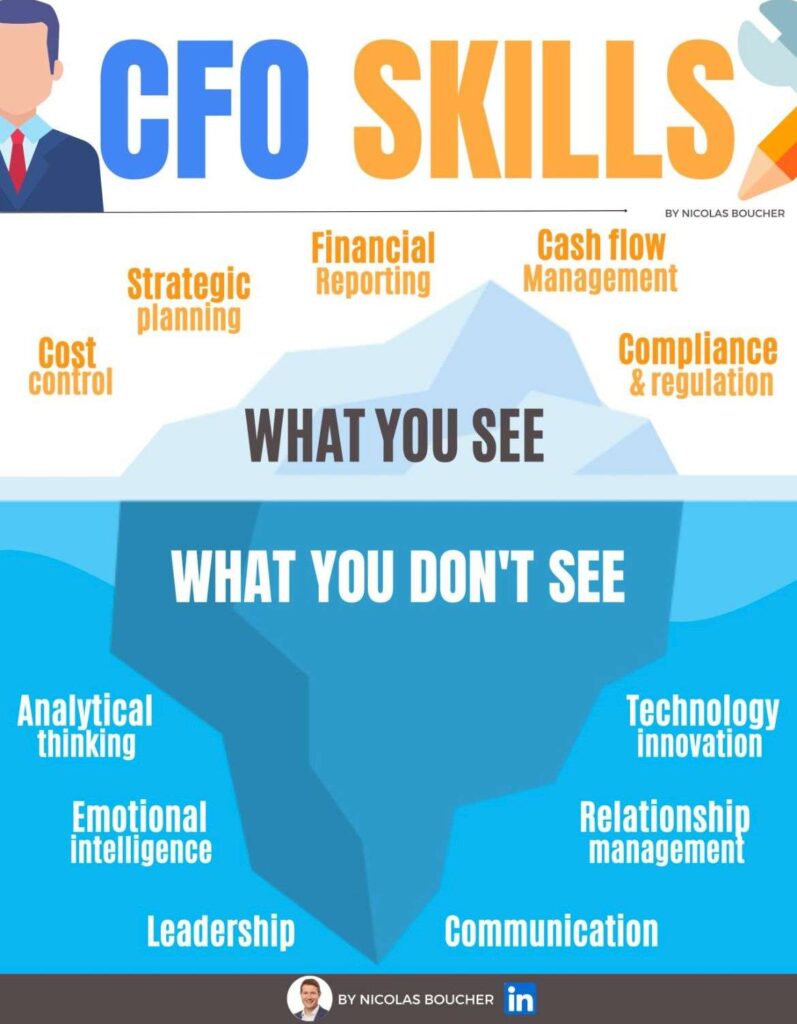Do you know what are the essential CFO skills?
The role of a Chief Financial Officer (CFO) extends far beyond just crunching numbers and managing financial records.
In today’s dynamic business landscape, CFOs are expected to possess a diverse range of skills that go beyond traditional financial expertise.
These skills are crucial for their success in driving strategic decision-making, managing risks, and ensuring the financial health of the organization.
Therefore, we will explore both the visible and less-visible skills that every CFO must have to excel in their role.
Table of Contents
What Are The Required CFO Skills
Here are the skills every CFO should possess.

Visible CFO Skills
- Financial Reporting: CFOs must possess a strong command of financial reporting, including the preparation of accurate and timely financial statements, budgeting, and forecasting. This skill ensures that the organization has a clear and transparent view of its financial performance.
- Cash Flow Management: Effective cash flow management is essential for the financial stability and growth of any organization. CFOs must oversee cash flow, working capital, and liquidity to ensure the availability of funds for operational needs, investments, and future growth.
- Strategic Planning: Aligning financial strategy with the overall business strategy and goals is a key responsibility of CFOs. By having a deep understanding of the company’s financial landscape, they can provide valuable insights and guidance in making strategic decisions that drive long-term success.
- Compliance and Regulation: Ensuring compliance with financial laws and regulations is a critical skill for CFOs. They must stay up to date with evolving regulatory frameworks and implement robust internal controls to prevent financial misconduct and maintain the trust of stakeholders.
- Cost Control: Monitoring and optimizing operational costs is a skill that directly impacts the organization’s profitability. CFOs must identify opportunities for cost reduction and increased efficiency, helping the company maximize its financial resources.
Less-Visible CFO Skills
- Emotional Intelligence: Emotional intelligence is often overlooked but is crucial for CFOs to excel in their role. Understanding and managing their own emotions, as well as the emotions of others, enables CFOs to navigate challenging situations, build strong relationships, and make sound decisions.
- Leadership: Effective leadership is key to motivating and guiding teams. CFOs must inspire their finance department and collaborate with other departments to achieve common goals. Additionally, they need to manage change effectively and foster a positive work environment.
- Communication: The ability to communicate complex financial concepts and data to non-financial stakeholders is essential for CFOs. By presenting financial information in a clear and concise manner, they can facilitate informed decision-making across the organization.
- Analytical Thinking: Analytical thinking enables CFOs to identify trends, patterns, and opportunities in complex financial data. Therefore, by applying critical thinking skills, they can extract actionable insights that drive business performance and support strategic initiatives.
- Relationship Management: Building and maintaining strong relationships with internal and external stakeholders is a skill that distinguishes exceptional CFOs. By nurturing these relationships, CFOs can enhance collaboration, gain valuable insights, and establish credibility and trust within the organization.
- Technology and Innovation: Staying abreast of financial technology advancements is vital for CFOs to leverage innovative tools and systems that improve efficiency and decision-making. By embracing technology, they can streamline processes, enhance data analysis, and drive digital transformation within the finance function.
Real-Time Example
To illustrate the importance of these skills, let’s consider a hypothetical scenario.
Imagine a CFO who excels in financial reporting, cash flow management, and compliance but lacks strong leadership and communication skills.
Despite having accurate financial data, they struggle to convey their insights to non-financial stakeholders effectively.
As a result, the organization faces difficulties in aligning financial strategy with overall business goals and fails to garner support for key initiatives.
On the other hand, a CFO with well-rounded skills, including leadership and communication, can successfully inspire the finance team. But also, collaborate with other departments, and gain buy-in for strategic decisions.
The Bottom Line
Visible skills, such as financial reporting, cash flow management, and risk mitigation, are essential for ensuring the financial health of the organization.
However, less-visible skills, including emotional intelligence, leadership, and communication, are equally important for driving strategic decision-making and fostering a positive work culture.
By cultivating a comprehensive skill set, CFOs can navigate the challenges of their role with confidence and contribute significantly to the success of their organizations.
Do you want to become an independent finance leader? Then, this is the perfect course for you! Sign up now and advance your finance career to unimaginable heights!
Additionally, do you wish to stand out in your finance job interview? Use my guide to prepare effective answers and impress your potential employer. Grab it now!
Key Takeaways
- CFOs require both visible and less-visible skills to excel in their roles.
- Visible skills include financial reporting, cash flow management, strategic planning, risk management, compliance, and cost control.
- Less-visible skills include emotional intelligence, leadership, communication, analytical thinking, relationship management, technology and innovation, and adaptability and resilience.
- These skills collectively enable CFOs to provide strategic guidance, drive financial performance, and establish strong relationships within the organization.











